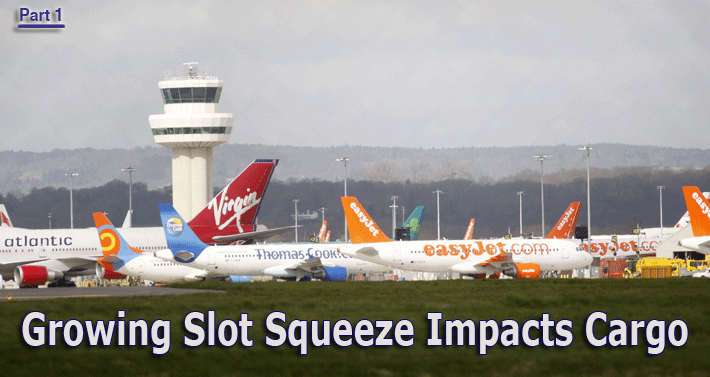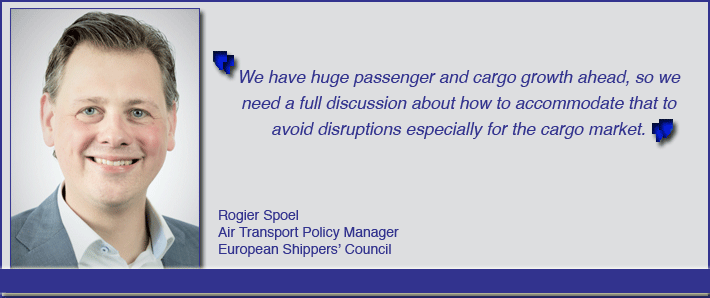
The lack of winter
season slots at AMS has forced freighter operators to find alternative
airports. It has also put the spotlight on the current critical lack of
global airport capacity, a shortage that most analysts only expect to
deteriorate in the years ahead and which is already putting the squeeze
on all-cargo airlines.
In the first of a three-part series, FlyingTypers
report what Europe’s shippers think and what steps might be taken
to relieve the situation moving forward.
Leisure Versus
Freighters
The battle for slots between all-cargo operators
and fast-expanding budget leisure airlines will be central to the global
debate over airport capacity for the next decade, believes the European
Shippers’ Council.
Rogier Spoel, Air Transport Policy Manager
at ESC, told FlyingTypers that in the next ten years there would
be “a fight” between freighter operators and fast-expanding
budget airlines. This will pit the rival economic benefits of high-value
cargo with its huge economic importance as a wealth multiplier, against
leisure airlines catering to populations which desire cheap and regular
flights to global destinations on services which often carry limited or
no bellyhold cargo.
“Airports are reaching maximum capacity,”
said Spoel. “Mostly this is to do with physical constraints, but
they can no longer expand at the same speed as the growth of aviation
as a whole. “We have huge passenger
and cargo growth ahead, so we need a full discussion about how to accommodate
that to avoid disruptions especially for the cargo market.”
Cargo Loses
Airport Slots
It is a debate that has already started
in earnest. In recent weeks AMS and its slot co-ordinator have conceded
that many all-cargo operators will lose slots this winter season, forcing
them to find alternatives at secondary airports such as Liege, Maastricht,
and Frankfurt Hahn as a result of AMS breaching its annual quota of 500,000
Air Traffic Movements, a figure decided upon within the framework of a
locally binding agreement signed in 2008.
Amsterdam is not alone in suffering capacity
constraints which are affecting freighter operators. Hong Kong, Paris,
Brussels, Chicago, Beijing, Mexico City, Frankfurt, Shanghai, and Heathrow
are other major cargo hubs currently suffering from slot shortages.
According to IATA, some 177 airports around
the world are currently capacity-constrained, around 100 of which are
located in Europe.
But with passenger levels set to double
in the next 20 years and strong air cargo growth also predicted, deciding
how to allocate limited slots will increasingly become a political and
economic debate pitching wider economic concerns against the desires of
voters for affordable and regular leisure options.
 |
Use It Or
Lose It
The AMS cull was largely down to the implementation
of ‘use it or lose it’ guidelines under IATA’s 80:20
regulations. IATA’s slot guidelines, which part 2 of this series
will look at in more detail, state that if an airline uses at least 80%
of its allocated slots it assumes historic rights to the slots for the
next season. Should it fall under 80%, it automatically loses them.
As Spoel outlines, it is far more difficult
for freighter operators to achieve the 80% goal than for passenger airlines.
“When a passenger does not show up
on time, passenger airlines will simply close their doors ready for take-off
and will keep their time slot,” he said.
“This is not the case for full freighters.
When cargo is not ready, they simply cannot take off. Also, a full freighter
flight is much more complex with uploading/unloading cargo, inspection
by customs, safety and security measures. In this respect, quality, not
punctuality, is the key for shippers.
“Also, many full freighter flights
have difficult flight schedules with multiple stops in one flight - a
delay at a certain airport affects their entire flight schedule and, therefore,
they are much more vulnerable to losing their time slot.
“This is exactly the case at Schiphol:
stuffed full freighters, with a load factor of 95%, are now forced to
move out because they have lost their slots.
Have Slots
Will Travel
The slots that have become available are
picked up by the leisure/low-cost segment. So, flights with a large economic
footprint are being replaced by flights with a much smaller one.
“Low-cost carriers are growing so
fast they are pushing out certain flights that are more important for
an economy.”
Carriers
React
Multiple carriers have been forced to divert
to secondary airports from AMS as a result of the slot shortage. Initial
estimates suggested around 20% of AMS’ freighter slots would be
lost this winter although a November agreement between Carriers AirBridgeCargo
and KLM, apparently reached after Russia threatened to close its air space
to Dutch carriers, has seen this fall to around 10%.
According to ESC, the problem with diverted
flights is the relative quality of service available away from established
hubs for carriers.
Secondary
Gateway Little Help
“The problem at secondary airports
is often a lack of expertise and supply chain know-how,” said Spoel.
“The customs regime might not be 24/7
or they don’t have state-of-the-art warehousing. Some don’t
have big enough runways for long-distance fully loaded freighters, some
face environmental restrictions and others don’t have the right
equipment.
“If the trend of cargo operators being
forced to these airports continues, shippers feel that a lot of investments
need to be made to get them at the same quality levels as major hub.
“Also, secondary airports are often
not close to distribution centers, which means more truck movements, which
in Europe will add to road congestion.”
ESC New Rules
ESC would like to see the IATA 80-20, effectively
a guideline, applied globally and in Europe imposed via EU regulations
and national rules, addressed to account for the operational variables
faced by freighter operators.
Ideally, Spoel would like a 70-30 provision
made for full freighter flights but he concedes it is a complex debate.
“We are looking at ways via legislation
we can do this,” he said. “We’re interested to know
what the European Commission and IATA thinks about this. If a country
has a policy at a certain airport and tries to favor some flights such
as freighters, we need to know Europe’s stance on this.
What Happens
Next
“We need to know what to do in next
few years and what tools we have.
“In the next five to 10 years there
are plenty of airports in Latin America, Asia and Europe that face slot
shortages.
“Changing the game at IATA would help
maintain full freighter operations at the major airports.”
IATA Passenger
Airline Dominance
However, ESC also notes that IATA is dominated
by passenger airlines. “They might pose a question ‘what is
in it for me?’,” said Spoel.
“The biggest competitors for the IATA
members are low-cost/leisure airlines, not full freighters.
Low-cost/leisure airlines are not IATA members.
“Making room for full freighters in
IATA’s slot allocation could make the position of passenger airlines
stronger vis-à-vis their competition with low-cost/leisure airlines.
“It is important to note that low-cost/leisure
airlines do not take any air cargo, not even belly cargo.
“It does not fit in their tight passenger
operation schedule.
“Not only are full freighters pushed
out, they are also replaced by airplanes with a lot of idle capacity in
the low-cost leisure segment.
Peaceful
Coexistence?
“One more advantage for full freighter
operations over low-cost/leisure is that freight does not use any passenger
facilities at the airports, therefore the substantive growth in passengers
can be tampered by using the full freighter operation as a buffer at the
major airports.
“Full freighters and passenger operations
must coexist at the major airports. But let’s not forget that freight
brings passengers because of the business opportunities it creates.”
SkyKing
|





